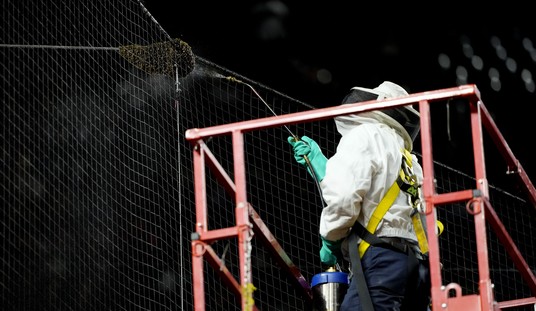The opinions expressed by contributors are their own and do not necessarily represent the views of RedState.com.
In 1836, American settlers in a Mexican territory that would later become the state of Texas fought a bloody fight against the Mexican government to protect the ownership of their property and liberty. The battle of the Alamo has since become a historical milestone in America’s history, and the phrase “remember the Alamo” has become ubiquitous – especially in the Lone Star State.
Unfortunately, 187 years later, a Texas business owner named Vince Cantu is engaging in an eerily similar struggle, but this time, it is against the Texas government in conjunction with the San Antonio City Council. To be clear, his life is not in peril, but the state is threatening his right to own property.
At the behest of Texas’ government, the city of San Antonio is set to use eminent domain to seize Cantu’s bar, called Moses Rose’s Hideout, which he has owned and operated for over a decade. The bar, named after Louis “Moses” Rose, who fled the Alamo before the iconic battle took place, sits next to the Alamo, a 19th-century mission used as a fortress in the fight against the Mexican government.
The Alamo Trust, the nonprofit which owns the property, and the Texas General Land Office (GLO) want the land on which Cantu’s bar sits as part of an expansion project that will draw more tourists – and their dollars – to the state of Texas and city of San Antonio. They aim to establish a $150 million visitor center and museum to make improvements to the attraction. Almost two weeks ago, the San Antonio City Council voted to start the eminent domain process, which means Cantu has until March 22nd to agree to a deal to sell his business.
The issue began about six years ago when the city first approached Cantu about buying his bar. “I got an offer from [former Texas Land Commissioner] George P. Bush in 2016, and it was a real estate contract with all the earnest money stuff in it,” he told RedState.
Cantu continued:
“So I asked an attorney about it, and they said, ‘Do you want to sell your property?’ I said, ‘Well, no, and especially not for that amount.’ So I just ignored it. And then, I guess two weeks later, the title company called me and said, ‘Hey, we’re scheduled for a closing. Are you coming in?’ And I’m like, ‘Hold on a minute. What?’ I had no idea. I didn’t know what eminent domain was. And I thought, ‘Wow, I better get a whole other attorney. It looks like I’m getting eminent domained.’ This could be the first step towards that, as far as I knew.”
To be clear, Cantu was open to selling his bar to the government but was unwilling to accept the GLO’s initial offer, which was only a little less than $1 million. He explained that the next attorney he worked with “was somebody that the government had worked with before” and that this person “went through this whole ruse about” scaring Cantu into agreeing to the government’s offer.
The bar owner then consulted with attorneys who specialize in eminent domain cases and realized that a common practice for governments is to use people’s lack of awareness of eminent domain to frighten them into agreeing to less-than-desirable offers for their property. He explained they use these tactics on folks who do not have “the educational background to understand what your options are.”
What is noteworthy about this story is that, from the beginning, the government led with leveraging eminent domain before entering good-faith negotiations with Cantu for the sale of his bar. Their approach became even more aggressive when Cantu counteroffered and said he would be willing to part with his business for $17 million.
The business owner explained that he viewed his counteroffer as part of the negotiation process. “If they were honestly negotiating with you and they knew your price was 15 million, then you guys would be closer to eight or nine million compromise, wouldn’t you?” he said.
It appears the state was never truly intending to negotiate. Cantu said it seemed as if they were only “checking off a box” when they made the initial offer but that they “never really wanted to negotiate with me.”
The Constitution mandates that if a government uses eminent domain, it must be done in the interest of “public use,” and it must give “just compensation” to the owner – a curiously ambiguous term that could mean whatever the state wants it to mean.
It is also important to point out that the San Antonio City Council is taking this action at the behest of the Texas government. Current Texas Land Commissioner Dawn Buckingham, a Republican, asked the council to undertake eminent domain proceedings because accomplishing this at the state level would be more of a challenge.
For the state government to use eminent domain, it has to be approved by members of the legislature, meaning it could face resistance from lawmakers. However, this is not the case if a city uses this tactic. The plan is for San Antonio to take Cantu’s property and then allow the state government to use the land to build the expansion to the Alamo.
The government has now offered about $4 million for the land on which Cantu’s bar sits. However, this would not compensate him for the lost revenue he would have accrued over time if he was allowed to continue running the bar. Moreover, seizing his property deprives him of the ability to pass his business down to his kids or grandkids as a form of generational wealth.
Nevertheless, some local media outlets are siding with the state, playing on people’s ignorance of all the factors that go into a deal like this. Cantu explained that “The narrative has always been on their side” and that “Alternative newspapers … won’t print my side of the story.”
Cantu’s supporters have organized a protest set to take place on March 11 near the Alamo to express their opposition to the government’s effort to seize his property.
Join LPBexar on March 11th as we protest the City of San Antonio and the State of Texas's decision to use eminent domain at the Alamo. For more information, or to RSVP to the event, click here: https://t.co/rLmHSZKoAM pic.twitter.com/gLDXA12QMo
— LPBexar (@LPBexar) March 1, 2023
The government’s number also does not consider the money he spent in building the business in the first place. Whether one agrees he should be paid $17 million or not, it is clear the city and state, which both stand to rake in quite a bit of cash from this endeavor, could provide more reasonable compensation.
The fact that the government agreed to buy out the owners of Ripley’s Haunted Adventure’s lease for $10 million indicates this should not be an issue. Indeed, Cantu said he would be willing also to accept such an offer. “So if they’re willing to make a deal with me at that number, around that number, close to that number, I think that would probably resolve the issue,” he said.













Join the conversation as a VIP Member